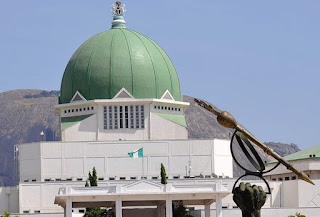Robbery, Thuggery, Now Forgery: A Legislative Evolution By Gbolahan Yusuf
The legislature. Many see it as the most important leg in the tripod of governance, especially given its power as a supervisory arm over the almighty executive even while limiting the power of the judiciary over it. It is public knowledge that any democracy revolves around the people (of, by, and for the people), and so the powers of the legislature are easily justified seeing as it stands for the people in any government. Or well, it should. The purity and sanctity of such an institution therefore should never be brought into disrepute.
That is the ideal situation.
The Nigerian situation however is that in 16 years of democracy, the legislative arm has steadily won and held fast to the responsibility of tarnishing the image of our democracy within and without. The country may be getting it right as portrayed in the last democratic transition from a ruling party to an opposition but until the custodians of democracy begin to act honourably, as their titles would have us believe they are, a giant question mark will still loom over the democratic tendencies or proclivity of Africa’s largest population.
From the inception of democracy, the National Assembly in particular has constituted a huge menace to the federal budget and contributed, in no small way, to a massive waste of taxpayers’ funds. This went on unnoticed for long before no less a personae than the then CBN governor himself, now Emir Sanusi Lamido Sanusi said about 20% of the federal budget was being spent on maintaining the National Assembly and that did not augur well for the nation’s treasury. The proclamation and its source sent shockwaves around the country and the agitation for a more open and less expensive National Assembly continues till date. A situation whereby a federal legislator will earn enormous separate allowances for vehicle fueling and maintenance, wardrobe, domestic staff, personal assistant, utilities, entertainment, house maintenance, constituency, among others, all besides their basic salaries, to make laws for people, majority of whom still live on about US$2 a day can only spell doom for the country. That this has been going on for so long is a clear case of the people being robbed blind. But this was not enough torture, so they moved on.
The immediate downside to turning our assemblies into money spinning machines, was the attendant legislative rascality that went into hallowed chambers on one issue or another. It is just like our motor parks; wherever there is free money, there will be lazy touts. From state houses of assemblies to the national assembly, matters often degenerate into cloth-tearing, chair-throwing, or mace-hitting drama. More disappointingly, such dramas oftentimes termed ‘crisis’ are never about the people but varying selfish ambitions. In many cases, there are even direct affronts on the rule of law by the same people who rightfully should be the custodians of the law.
Not a few times have we seen a lesser number of legislators in a House try to hijack the chambers, in what assumed a disturbingly high increase under the past administration in particular. Ogun, Edo, Rivers, and more recently Ekiti are all states where legislative rascality rose to new heights in the past federal administration and curiously also, all mentioned states at the time of their ‘crisis’ had their assemblies controlled by the then national opposition party. In one case, five “honourable” members were going to impeach a speaker of a House of about 24 members.
The rule of law was never considered, at least not where it impeded selfish ambitions. But still our legislators won’t stop, they move on.
After the leadership of the 8th Senate was voted in, some members were quick to notice that the Senate Standing Rules of 2011, which had not being amended following due process as articulated in the rules itself, had some alterations as presented in the Senate Standing Rules of 2015, which was used for the election of the presiding officers. Senator Kabiru Marafa alerted the floor of the Senate to this impropriety but was swiftly overruled by the Senate President. Subsequently, the police after receiving a petition on the matter carried out their investigations and though the report of the probe has yet to be disclosed by the police, it has been reported that the report of the probe has been sent to appropriate authorities for further action and that it confirmed forgery of the rule book, while indicting the Clerk to the National Assembly. In the summary of these reports, it was claimed that the police asked the Ministry of Justice to determine if it should be treated as crime or left alone as a matter to be treated on the Senate floor. Again, the power of our legislature at play.
It is alarming that crime can now be committed in our hallowed chambers and be seen as a legislative problem that should be settled in-house. Senator Shehu Sani re-echoed such infuriating sentiments when he asserted that the case should never have involved the police. According to this faulty theory, while the legislature checks the executive, the judiciary should have no powers over the legislature.
If indeed forgery has been established, many questions remain unanswered; Who altered? On behalf of whom? For what purpose? These pertinent questions and more will have to be answered if we must stop this dangerous trend in our assemblies.
If rules can now be amended without any subsequent reaction, then legislators around the country may just have found a new instrument to further expose our democracy to ridicule. The sad part is to realize that our legislative has been evolving at the same time the people they represent have been revolving around the vicious circle of unemployment, poverty, and insecurity. May God help Nigeria.


Comments
Post a Comment